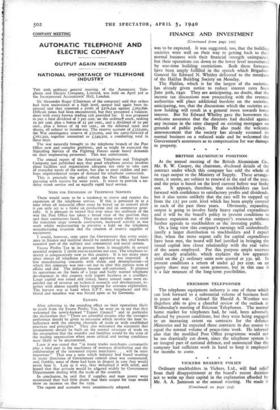COMPANY MEETING
AUTOMATIC TELEPHONE AND ELECTRIC COMPANY
OUTPUT AGAIN INCREASED NATIONAL IMPORTANCE OF TELEPHONE INDUSTRY THE 20th ordinary general meeting of the Automatic Tele- phone and Electric Company, Limited, was held on April 3rd at the Incorporated Accountants' Hall, London.
Sir Alexander Roger (Chairman of the company) said that orders had been maintained at a high level, output had again been in- creased and they reported a profit of £276,249 against £265,896. Difficult times had been encountered, but they presented a balance- sheet with every known trading risk provided for. It was proposed to pay a final dividend of 7 per cent. on the ordinart stock, making to per cent. plus a bonus of 24 per cent., and a dividend of to per cent., plus a bonus of 24 our cent., on the deferred stock and shares, all subject to income-tax. The reserve account of £332,0oo, the War contingency reserve of £5o,000, and the carry-forward of £567,302, together amounted to £549,302, a comforting total in these days.
The war naturally brought to the telephone branch of the Post Office new and complex problems, and as might be expected the Signalling Service of the Fighting Forces made heavy demands on their engineering personneL This was unfortunate.
The annual report of the American Telephone and Telegraph Company just published says that good telephone service involves plant facilities and organisation adequate not only to take care of everyday needs of the nation, but also to meet sudden and per- haps unprecedented surges of demand for telephone connection.
This is precisely the policy which the Post Office had been pursuing with success for some years. It strove to provide a no- delay trunk service and an equally rapid local service.
NEED FOR EXPANSION OF TELEPHONE SERVICES
There would seem to be a tendency to starve and restrict the expansion of the telephone service. If this is persisted in at a time when all industrial effort must be keyed up to concert pitch it can only act as a brake on production and on commerce gene- rally. It is pleasant to record that ever since the outbreak of the war the Post Office has taken a broad view of the position they and their contractors faced. They are making every effort to assist the transition stage towards contractors, increased activity in war work whilst endeavouring to preserve a hold on the telephone manufacturing situation and the creation of reserve supplies of equipment.
I would, however, urge upon the Government that every assist- ance in finance and material should be rendered to this vital branch essential part of the military and commercial and social system.
Excess Profits Tax in its present form is inequitable in several essential respects. I invite you to examine our case. The telephone in- dustry is comparatively new to this country. It is not many years since almost all telephone plant and apparatus was imported. A few manufacturing concerns with vision and determination—of which this company was one—set out to alter this parlous state of affairs and did. The industry became self-contained. It planned its operations on the basis of a large and badly wanted telephone development in this country with export business as a corollary. Large capital was raised and risked, heavy annual sums were ex- pended out of revenue on technical research and development, to- gether with almost equally heavy expense for overseas exploitation. The harvest was at hand when E.P.T. was introduced and this brutal and senseless war was forced upon us by Germany.
EXPORTS
After referring to the retarding effect on their operations likely to result from the Excess Profits Tax, he went on to say that they welcomed the newly-formed " Export Council " and in particular the declaration that " There are powerful reasons why the strongest preference should be given to measures which involve the least in- terference with the existing channels of trade or with established practices and principles." They also welcomed the statement that arrangrnents should be built on the normal structure of trade on the assumption that the sounder and healthier would be the state of the trading organisation when more critical and testing conditions were likely to be encountered.
Later it was stated that " in 'many trades merchants customarily play a vital part in the machinery of overseas distribution and the collaboration of the interested export merchants . . . will be most important." That was a note which industry had found wanting in many directions of Government control since war commenced, and, frankly, some of them had been in despair in case they would never hear it. Late as it was, they welcomed it with relief, and hoped that that attitude would be adopted widely by Government Departments dealing with the trade of the country.
In conclusion, he said that if supplies and man power were maintained they had little doubt that their output for 194o would show an increase on that for 1939.
The report and accounts were unanimously adopted.














































 Previous page
Previous page